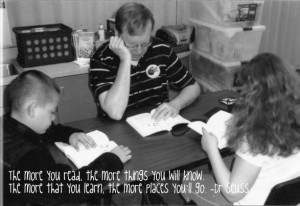When I read to at-risk children they rewarded my availability with a priceless gift.

In the early nineteenth century, Margaret Fuller (1810-1850) was considered to be the most well-read person in New England, and she was the first woman allowed to use the library at Harvard. As a pioneer in the women’s movement she certainly deserves our attention, but just as fascinating to me are all those books. She read them in an era when codices were expensive, hard to obtain, and from an entertainment and educational perspective were the ‘only game in town,’ if you will. Despite her larger-than-life reputation regarding the reading of books, Fuller never lost sight of the importance of reading for the greater community. It was she who said with simple eloquence, “Today a reader; tomorrow a leader.”
I am not sure if Fuller was the first to observe the association between reading and leading, but I am sure that this connection is almost universally accepted today. That’s the idea that is the engine that moves Read to Lead (or is it Lead to Read? I get confused…), a program of adult volunteers helping at-risk elementary school children in Kansas City. This enlightened program was started by Lynn and Jean Rundle, friends of mine who brainstormed and prayed about how to make a difference in their community by helping kids develop valuable tools that might serve them well in the frequent chaos of their social milieu. That sounded good to me, so I volunteered and was assigned to two fourth graders, Erin and Miguel,* in a school with a predominately Hispanic student enrollment.
We began by reading Madeleine L’Engle’s A Wrinkle in Time. I was surprised immediately by their evident passion for reading, a fervor I pray neither they nor I will ever lose. Erin was adept at understanding the author’s thesis and the connection of parts of the story to the larger plot. Miguel distinguished himself as a rapid reader, swiftly moving through the text while correctly pronouncing even the words he had never before encountered. He did this despite the fact that English is but the second language in his home. My job was to listen to their reading and offer whatever I could to help their comprehension and expand their vocabulary without snuffing out their passion, let alone stoke its fire.
Each day I came I found that they had read ahead at home, and actually helped me understand what was going on in the lives of the characters–and in his and her own world. We sailed through L’Engle and on to Diary of a Wimpy Kid. Once in a while they asked me to read. Erin told me she liked to hear the sound of my voice. I was never sure if she asked me to read because she was comforted by a man’s voice, but at least the act of being read to brought comfort. I noticed that she asked me this whenever she wasn’t feeling well, like the two times she was nauseated from the virus that was being passed around in her house or the time she was on the verge of tears because the landlord had discovered they were keeping a puppy and threatened eviction if they did not get rid of the dog. When she asked me to read the week after the dog had gone to the pound, she laid her head on the desk and seemed to be fighting tears, though she was so brave and strong I was sure she would never admit to the internal struggle. Before our time was up she asked to read again (“We read to know we’re not alone,” wrote C. S. Lewis.).
During these times Miguel was uniformly steady and prepared to read. Like a person who prefers the rye chips in the party mix, he relished selecting his favorite parts of the story and laughed a little as he related his reason for liking these bits. He also opened his door a small crack, allowing me to glimpse his perspective on his parents’ struggle to survive in a new country. I treasured these vivid pictures, painted with Miguel’s guileless brush. I envied the closeness and joy he felt in being an important part of his large extended family, who worked together, cried together, and showed singular genius in their ability to celebrate in one another’s company.
I enjoyed the books as well, and I found myself captured by the music of their carefully measured cadences and incipient efforts at mature expression. They absorbed the story so well I often felt I was the one being entertained. My self-consciousness was effaced and I was wrapped in the joy of a well-spun tale. As one who is startled awake when he realizes he is falling asleep, I sometimes shivered when I found myself so caught up in the story as they read that I forgot I was supposed to be providing analysis. On balance I felt I was getting more out of this “volunteering” than they were.
The last Spring day I read to Erin and Miguel we joined their teacher, classmates, and other volunteers in a celebration of the semester complete with exchanged gifts (Books! What else?) and sugary snacks. I was able to utter a few public words of encouragement to Erin and Miguel that were barely heard above the din of a classroom full of children relishing frosted cupcakes. Each of my young readers expressed appreciation after their teacher reminded them of its importance, and they sweetly shook my hand as they thanked me and wished me a good summer. I congratulated them on their excellent reading but uppermost in my mind was the thought that I would miss them next week.
It seems naive folly to imagine that education can cure the ills of our pluralistic societal experiment. History affords too many examples of well-educated wretches and evildoers. I lack the buoyancy of a giant like Margaret Fuller. Thus I am unable to predict whether the self-confidence gained through reading will help Erin and Miguel make better decisions when they are faced with the choice between right and wrong that will define their life’s course, let alone lead. But I do know–and hope they are aware of this–that they have a new friend in their corner who believes something better for them and is cheering for them. When they lose their source of comfort or when the passion wanes, I hope that they will remember me as a small but functioning part of their cloud of witnesses. I pray that they will make a connection from our briefly shared time of this likely faded realization: when someone glimpsed something of promise in them, it is because the promise is there indeed. Who knows? That might just prove to be enough.
Reading exposed me to more erudite voices than my own. I can still recall Erin’s voice as she read a relevant passage from Madeline L’Engle’s book: “Nothing is hopeless; we must hope for everything.”
I will keep reading.
(*Not their real names)
 #Trust30 Prompt: If ‘the voyage of the best ship is a zigzag line of a hundred tacks,’ then it is more genuine to be present today than to recount yesterdays. How would you describe today using only one sentence? Tell today’s sentence to one other person.
#Trust30 Prompt: If ‘the voyage of the best ship is a zigzag line of a hundred tacks,’ then it is more genuine to be present today than to recount yesterdays. How would you describe today using only one sentence? Tell today’s sentence to one other person. 

